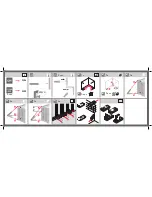
201
15.10 PARALLELISM BETWEEN LINE OF SIGHT AND EMITTING AXIS
Check:
1. Set the reflector 50m away from the instrument.
2. Collimate the center of the reflector prism with telescope reticle.
3. Switch on the instrument, and enter into Distance Measurement Mode. Press [DIST]
(or [All]) to measure. Rotate the Horizontal Tangent Screw and Vertical Tangent Screw
to launch electric collimation and make the light path of EDM unblocked. In the bright
zone find the center of emitting photoelectric axis.
4. Check the center of reticle to coincide with the center of emitting photoelectric axis.
If so, the instrument is proved eligible.
Adjustment:
If the center of reticle deviates from the center of emitting photoelectric axis, user
should sent the instrument to professional repair department.
15.11 TRIBRACH LEVELING SCREW
If the leveling screw appears flexible, adjust the two adjusting screw in the
leveling screw to tighten the screw appropriately.
15.12 RELATED PARTS FOR REFLECTOR
1 The Tribrach and Adapter for Reflector
The plate vial and optical plummet in the adapter and tribrach should be checked.
Refer to Chapter 15.1 and 15.8 for more information.
2 Perpendicularity of the prism pole
As illustrated in Chapter 15.8, mark „+‟ on Point C, place the tine of the prism
pole on the Point C and do not move during the inspection. Place the two feet tine of
Bipod on the cross lines of Point E and F. Adjust the two legs “e‟ and “f” to make the
bubble on the prism pole centered.
Set and level the instrument on Point A near the cross. Sight the tine of Point C
with the center of reticle, and fix the Horizontal Clamp Screw. Rotate the telescope
upward to make D near the horizontal hair. Flex the prism pole Leg “e” to make the D
in the center of reticle. Then both Point C and D are on the central line of reticle.
Set the instrument on Point B to another cross lines. With the same way to flex the
















































